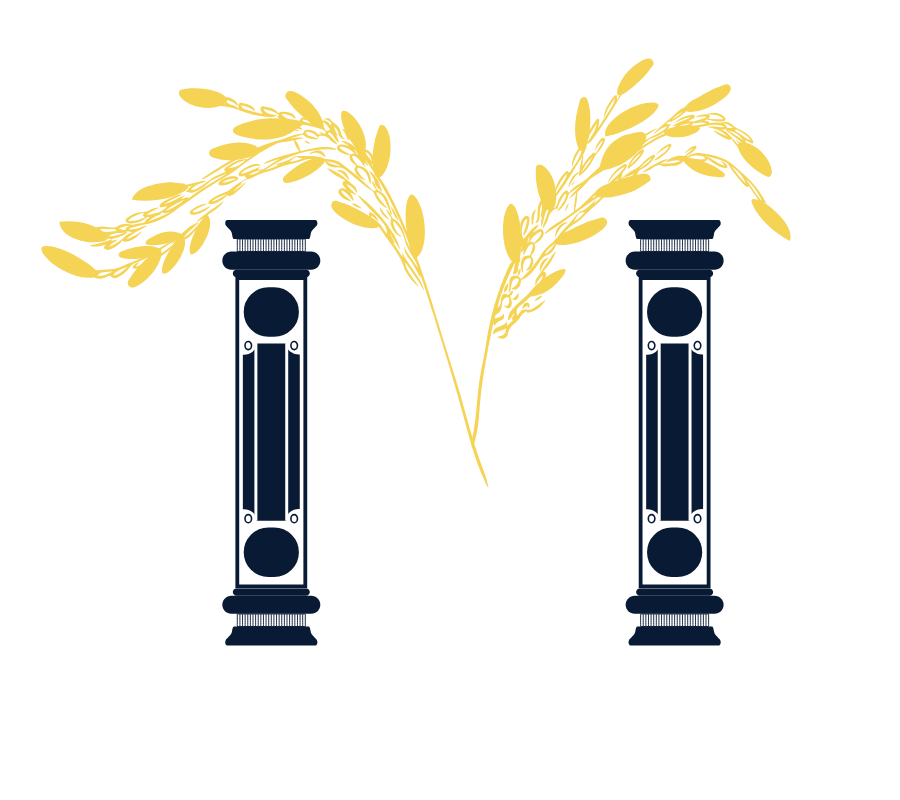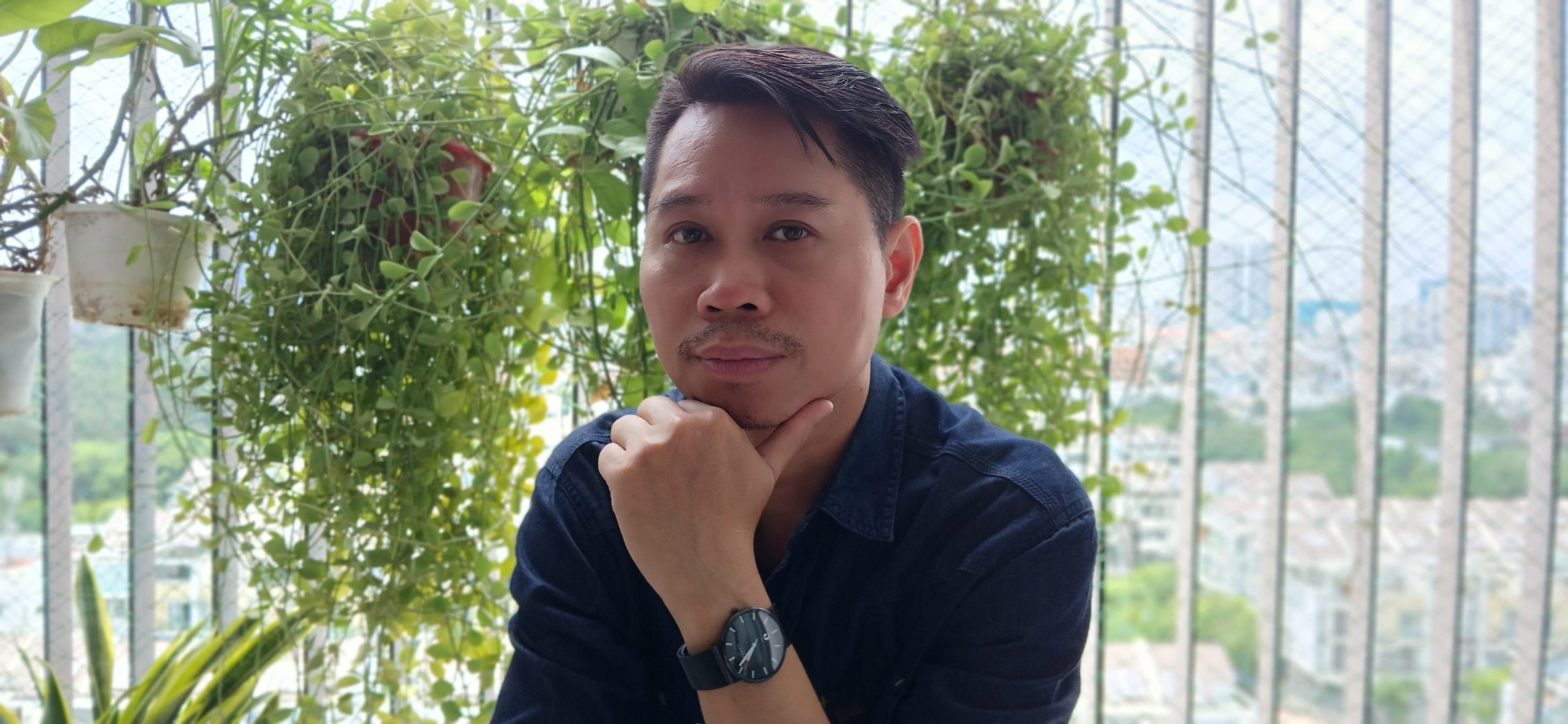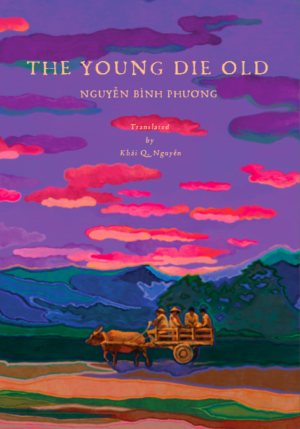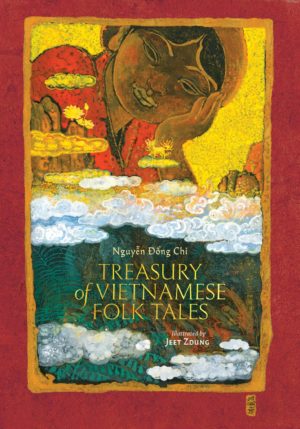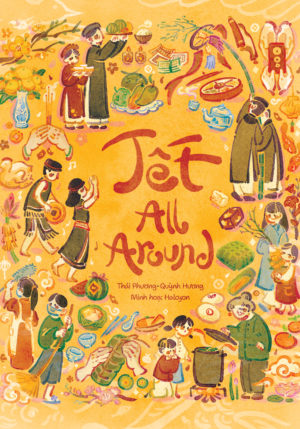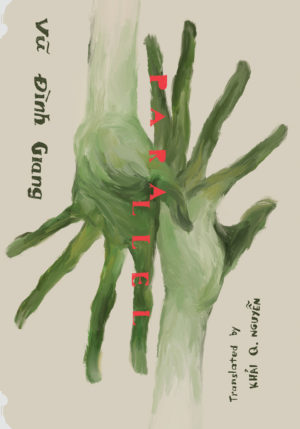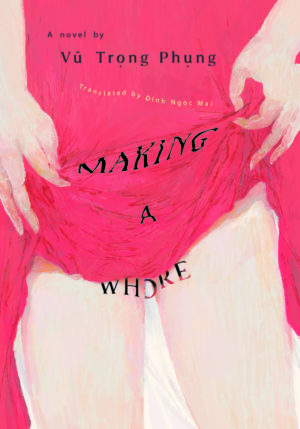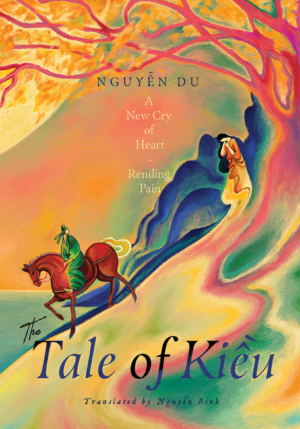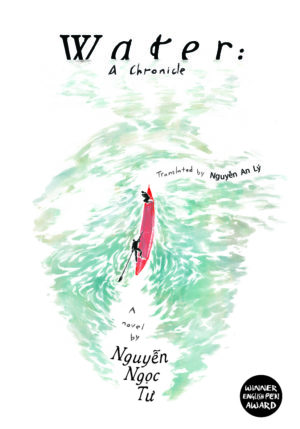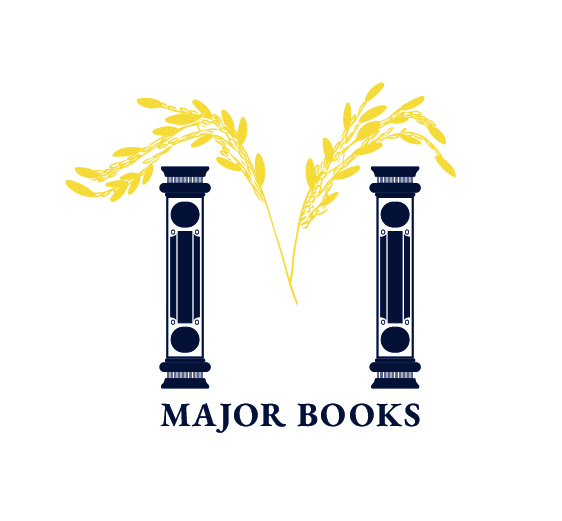Originally published on ZZZ Review (currently on hiatus), October 2020, translated from the Vietnamese by Anh Thư Trương Nguyễn. (This interview first appeared in a slightly different form on ZZZ Review.)
Vũ Đình Giang was born in 1976 in Tiền Giang in the Mekong Delta. He studied graphic design at Hồ Chí Minh City University of Architecture. His work has been recognised by Writers in their 20s’ Contest, one of Vietnam’s oldest and most reputable prizes for emerging literary talents. Parallels is Vũ Đình Giang’s début novel, first published in 2007 and re-printed in 2011.
Translated into French by Yves Bouillé, Parallels was published in 2014 by Éditions Riveneuve in collaboration with the National Institute of Oriental Languages and Cultures (INALCO) in Paris, alongside other acclaimed contemporary Vietnamese works. Parallels has, however, not been widely available, due to a limited print run. This conversation hopes to shed some light on Vũ Đình Giang‘s writing process and inspiration, as well as his novel Parallels.
Khải Q. Nguyễn (K.): When did you start writing fiction?
Vũ Đình Giang: I wrote my first short story when I was eighteen, right in the middle of an exam season. It was in the spur of the moment, raw, written on school paper. It described the experience of taking exams like a rite of passage. I signed it with an alias and sent it to Áo Trắng Magazine. And it was selected for publication. It all started from there.
K.: How long did it take you to write Parallels? Do you have a plan when you write? (Are you the type of writer that will come up with a plan for your characters beforehand?)
Vũ Đình Giang: It took me a year, more or less. But the novel had formed in my head before that, before I turned eighteen. I felt too old to keep writing for litmags here and there, where a distinctive piece of prose barely got any attention. I felt that novice era had to end. With short stories, I go on instinct, let myself be inspired in the moment. It’s more difficult with novels, I always have to sketch it out first, a habit I’ve developed since my younger days in college; it helps me pay better attention to structure and composition, and the rhythm. I then make adjustements as I write. Even then, things can change unpredictably.
K.: Do you write on paper or on your computer?
Vũ Đình Giang: On computer. Except for my first two years at university when I wrote on paper.
K.: Parallels opens, and ends, with the death of Leslie Cheung, a gay icon in Asia. Are you a fan of Leslie Cheung and his movies (Happy Together, Farewell My Concubine, movies mentioned in your novel)?
Vũ Đình Giang: Like any young person at the end of the nineties, mass entertainment like music and movies were not readily available to me. I guess everyone is familiar with those movies, those icons, the masterpiece Farewell, My Concubine. I was enamoured by anything that I found. The youth always have a burning passion for everything.
K.: At the time, did the news affect you?
Vũ Đình Giang: Throughout my student years I read about many artists committing suicide, from all industries, and their hidden troubles as well as their embarassments. Every time I heard that another star was extinguished, it often took me a while to ponder on fate and limitation. As long as their talent and legacies will live on….
K.: Do you watch many gay movies? Are you impressed with a particular one?
Vũ Đình Giang: It’s difficult to name them all because there are so many works throughout the years. But generally speaking, I like films that are more relevatory, daring, and socially challenging, more so than ‘purely eye-catching’ ones.
Before movies, it is always books that pave the way. In particular, it was Annie Proulx’s masterful writing, I believe, that captured people’s hearts with Brokeback Mountain, even before the moving image helped popularise it.
K.: H’s sex life could be said to be very diverse, but he is very lonely. Could you say this is an aspect of gay life?
Vũ Đình Giang: Perhaps. But in this story, I think it can apply to anyone regardless of gender or sexuality, it’s up to the person.
K.: Kan’s story of the old man and the horse–did you have any intention with this story? Did you ever hesitate to include this episode in your novel?
Vũ Đình Giang: I was intent on it from the start. I needed an image that was powerful and clear enough to go with a character whose inner thoughts were brimming with lust. In context it was a bait, a catalyst, while in the readers’ point of view it was a turning point for the plot. Setting this up allowed the ensuing decadent events to flow naturally.
K.: G.g, after recounting the affair between him and the old neighbour he considered an adoptive father, concluded: ‘We belonged to another world, which could’ve been visible or invisible; an unnamed world that had yet to be recognised.’ H says: ‘…we are all stray creatures, outcast and abandoned.’ In your imagination, does a utopia exist for them?
Vũ Đình Giang: No. Utopia only surfaces in art, a space where the minority, skilled in the art of curating and editing, offer the majority a temporary escape from distress. None of us is spared from facing reality, because sadness is a rule of the universe.
K.: Sexual relations between a young person and an older person can be considered a sensitive topic. Through G.g’s story of him and his old neighbour, Parallels also challenges the idea that younger people are unaware of their sexual wants. Would you like to elaborate a bit further?
Vũ Đình Giang: I don’t think it is a taboo subject. Before modern psychology probed it, laws forbid it, and social morals made a fuss about it, it was there, ready to be explored. Repressed at all costs by social forms and religious edicts, it was latent yet natural. Myths, fables, folk ideas, beliefs, ancient art…there were traces of it everywhere. People try not to acknowledge it. Later on, novels exploit it as something deeper, darker. I have only practiced writing a few small passages. It could be said that, when it comes to dark complexes like paedophilia, incest, heterosexuality or transsexuality, writing and arts are, in essence, more underrepresented than what happens in real life.
I would like to add that paedophilia is also one of the realities that gay people like to experience, the complex of the active victim or something like that, before identities are revealed, although they will later turn around and denounce it. Of course, my stance is not compatible with the taste of the general public, which feeds gossipy headlines, ridiculous television reports, and vulgar crippling trials. Reality is much more indifferent; it is neither sweet nor bitter, neither good nor bad, it goes beyond all moral frameworks. If a writer feels compelled to write something, then they will boldly reveal them on the page, as they are.
K.: Your characters only have nicknames. Why is that?
Vũ Đình Giang: Because that world loves using nicknames online.
K.: The characters’ concept of time is very ‘queer’, do you think it is because of the characters’ queerness that their conception of time is also ‘queer’?
Vũ Đình Giang: Thank you for pointing that out. Your question is also your answer.
K.: In my observation, the father is always absent in all three of the characters’ lives; Kan’s father left him when he was young, H never mentions him, and G.g’s father abused him. Why is that?
Vũ Đình Giang: The book is, of course, set in the contemporary society. There is a pattern I’ve noticed where, under the influence of traditional concepts, the institution of patriarchy is often glorified by slogans like ‘a father’s efforts defy metaphor[1]’. In reality, most of the Vietnamese gay community have some distance from their fathers. That is also the conflicts of gender (orientation) and sex (biological).
The absence of the father figure from these characters’ lives is an obvious metaphor: by removing them completely from their world, it is an attitude of resistance against the symbol of masculine tyranny.
K.: Your characters make a lot of references to the life and career of Truman Capote. Do you often read works of gay writers? What are your favourite titles?
Vũ Đình Giang: Obviously, I like In Cold Blood, a celebrated and recognised classic. I also learn about what is required to write non-fiction, the different developments in genres and subgenres, and how they intersect with biographic or autofiction writing. I make note of how those techniques can improve literary prose, instead of getting bogged down by narration.
K.: Were you influenced by any particular writers (Vietnamese or foreign, queer or non queer?)
Vũ Đình Giang: Countless. I am influenced by each writer that I admire. I have met experienced writers who had to overcome many suppressions, or cruel prejudices. In my early days, when my voice still hadn’t formed, I came upon the writing of a pioneering writer obscured by time, whom I wish to keep anonymous. Back then, I was unaware of how influential this literary figure was, whose knowledge and craftsmanship of Vietnamese astonished me. The murky stream of history tries to erase talented pioneers that resist acts of erasure. I change as a writer when I discover such writers that have come before me.
K.: Loneliness is (one of many) red threads within the novel. Do you think that, for these characters, loneliness is inevitable?
Vũ Đình Giang: I’m not sure how to answer this question. Sorry!
K.: Besides your writing, you also make art. G.g is also an artist, and he admires the great Belgian artist René Magritte. Do you have any favourite artists? How does being an artist help you build the world of your novel?
Vũ Đình Giang: I don’t feel competent enough to discuss other disciplines, and famous painters, who are so great. I do believe that to enrich my writing effectively, if I only read prose, live and write haphazardly, there is no way I can refine the rough edges. Fine arts, design, architecture, music, theatre, cinema… are always endless sources of inspiration. Even if we lack the expertise or do not belong to these fields, we should learn to enjoy them.
K.: Does Song song (Parallels) tell of the parallellism of the three characters’ lives, or ‘something’ parallel between G.g and H?
Vũ Đình Giang: Oh, outside of the content, it is also my statement on my writing philosophy.
K.: What do you think about LGBTQ+ works from Vietnamese authors?
Vũ Đình Giang: I am out of the loop, so I cannot make a complete observation. It is also my view that, not only LGTBQ+ works, but all genres, I have soon learned to make a distinction: the nature of writing is different, between those who are conscious of the need to write and those who are passionate about storytelling.
K.: Are you currently working on anything?
Vũ Đình Giang: I have two novels awaiting publication: ‘Độc tố’ and ‘403A’.
K.: I remember you were once asked in an interview about the connection between the experiences of a character and that of the author itself. Would you like to answer it again, for ZZZ Review’s readers?
Vũ Đình Giang: After ten years since it was published, I find it prudent to not repeat rash statements–I’ve grown weary of self-glorifying tendencies. Writing as a career is truly a difficult path, even if one has established themselves.
[1] Translator’s note: this is roughly translated from the Vietnamese saying: ‘Công cha như những ví von’ which is in reference to the famous folk couplet that compares the character of the father and the mother to natural elements: ‘Công cha như núi Thái Sơn, Nghĩa mẹ như nước trong nguồn chảy ra.’ (“The work of a father like the Thái Sơn mountain, the will of a mother like water streaming from its source”; lit translation).
